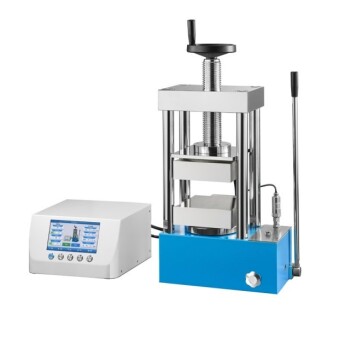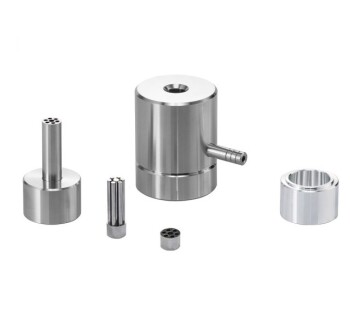In materials science and engineering, the laboratory hot press is not just a tool; it's a crucible for innovation. It is indispensable because it provides the precise, simultaneous control of temperature and pressure necessary to fundamentally alter a material's structure. This capability allows researchers to develop entirely new materials, optimize complex production processes, and create high-quality samples for analysis across fields ranging from ceramics and polymers to advanced composites.
The true value of a hot press isn't just in shaping a sample; it's in precisely controlling the atomic and crystalline structure of a material. By applying targeted heat and force, researchers can engineer materials with enhanced density, strength, and stability that would be impossible to create otherwise.

How a Hot Press Fundamentally Alters Materials
A hot press goes beyond simple molding. It functions as a controlled environment to force changes in a material's internal architecture, which in turn dictates its final performance characteristics.
The Principle of Controlled Consolidation
The working principle involves placing a material, often in powder or layered form, into a mold between two heated plates, known as platens. A specific temperature, pressure, and duration are set. The combination of heat softens the material while the pressure forces the particles or layers together, consolidating them into a solid, dense form.
Driving Key Material Transformations
This controlled environment is ideal for initiating specific physical and chemical changes. The most critical of these include:
- Sintering: Heat and pressure cause individual particles to bond and fuse, drastically reducing the empty space (porosity) between them. This is essential for creating strong, dense ceramics and powdered metals.
- Phase Transformation: The applied energy can force a material's crystalline structure to change from one phase to another, unlocking different properties like hardness or magnetic behavior.
- Solid-Phase Reactions: The press can create conditions where two or more different solid materials react to form a new compound or composite material at their interface.
Achieving Superior Material Properties
These transformations directly result in materials with enhanced characteristics. By forcing particles closer together and eliminating voids, the hot press dramatically increases a material's density and mechanical strength. The controlled thermal environment also allows for the creation of materials with higher thermal stability and specific engineered properties.
The Strategic Advantage in Research & Development
For a research facility, the hot press isn't just a piece of equipment; it's an asset that directly impacts the pace and scope of discovery.
Accelerating the Innovation Cycle
Direct hot pressing often involves very short sintering and processing cycles compared to traditional furnace-based methods. This ability to quickly produce and test a sample means researchers can iterate on new ideas much faster, accelerating the entire material development timeline from weeks to days.
Unlocking New Material Possibilities
The versatility of a hot press is one of its greatest strengths. It allows researchers to experiment with a vast range of materials—from bonding polymer layers to creating metal-matrix composites. This flexibility is crucial for exploratory research aimed at discovering novel material combinations.
Ensuring Repeatability and Precision
Scientific progress depends on repeatable experiments. A modern laboratory hot press offers exact control over the critical variables of temperature, pressure, and time. This ensures that a successful result can be replicated consistently, which is the bedrock of credible research.
Understanding the Practical Trade-offs
While powerful, the hot press is a specialized tool with specific limitations that are important to understand. It is a tool for precision research, not mass production.
Sample Geometry and Size
The final component is constrained by the size and shape of the press platens and the available molds. This typically limits its use to creating relatively simple, flat, or cylindrical shapes, often referred to as "pucks" or "coupons," for testing purposes.
Throughput vs. Industrial Methods
While it accelerates research iterations, the hot press is a low-throughput, batch-based process. It is not designed for the high-volume output required in industrial manufacturing, where methods like injection molding or continuous extrusion are used.
The Need for Process Optimization
The precision of the hot press is also a challenge. Finding the perfect combination of temperature, pressure, and time for a new material is not a simple task. It requires expertise and a systematic process of experimentation to dial in the parameters that will yield the desired properties.
How to Apply This to Your Project
Your research goal will determine how you leverage the hot press.
- If your primary focus is developing novel composites: Use the hot press to explore the bonding integrity between dissimilar materials under controlled conditions.
- If your primary focus is improving ceramic density: Leverage the hot press for sintering to eliminate porosity and significantly enhance mechanical strength.
- If your primary focus is rapid prototyping of new alloys: Take advantage of the short cycle times to quickly iterate on different formulations and processing parameters.
Ultimately, the hot press empowers you to move beyond observing materials and begin designing them at a fundamental level.
Summary Table:
| Key Aspect | Description |
|---|---|
| Core Function | Simultaneous control of temperature and pressure for material consolidation and transformation. |
| Key Processes | Sintering, phase transformation, solid-phase reactions to enhance material properties. |
| Benefits | Accelerated innovation, superior density and strength, repeatability in experiments. |
| Limitations | Limited sample size and geometry, low throughput, requires process optimization. |
Ready to enhance your materials research with precision and efficiency? KINTEK specializes in high-performance lab press machines, including automatic lab presses, isostatic presses, and heated lab presses, designed to meet the exacting needs of laboratories. Our equipment helps you achieve faster innovation, superior material properties, and reliable results. Contact us today to discuss how our solutions can transform your R&D projects!
Visual Guide

Related Products
- Lab Heat Press Special Mold
- 24T 30T 60T Heated Hydraulic Lab Press Machine with Hot Plates for Laboratory
- Automatic High Temperature Heated Hydraulic Press Machine with Heated Plates for Lab
- Manual Heated Hydraulic Lab Press with Integrated Hot Plates Hydraulic Press Machine
- Laboratory Manual Heated Hydraulic Press Machine with Hot Plates
People Also Ask
- What is the purpose of applying high-pressure co-pressing to electrodes and electrolytes during the assembly of an all-solid-state sodium-sulfur battery? Build High-Performance Solid-State Batteries
- What makes automated CIP systems cost and space-efficient for laboratory settings? Maximize Your Lab's Space and Budget
- What are the typical operating parameters for hot pressing using a graphite mold? Master High-Temperature Sintering
- Why is external pressure applied to the LLZO electrolyte and lithium metal electrode? Achieve Optimal Solid-State Battery Performance
- Why is external stack pressure necessary for anode-free solid-state batteries? Ensure Stable Cycling & Prevent Failure



















